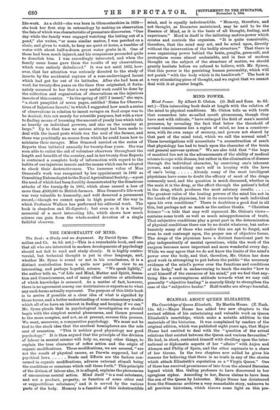The Soul : a Study and an Argument. By David
Syme. (Mac- millan and Co. 4s. 6d. net.)—This is a remarkable book, and one that all who are interested in modern developments of psychology should not fail to read and study closely. It is highly contro- versial, but technical thought is put in clear language, and, whether Mr. Syme is sound or not in his conclusions, it is a distinct contribution from a quite now point of view to an interesting, and perhaps hopeful, science. "We speak lightly,' the author tells us, "of Life and Mind, Matter and Spirit, Sensa- tion and Consciousness, and of many other entities or attributes of which knowledge is assumed. As a matter of fact, however, there is no agreement among our doctrinaires or experts as to what any such terms actually represent. The purpose of this little book is to arrive if possible at a clear idea of what is signified by those terms, and a better understanding of some elementary truths which all of us have an interest in finding and keeping if we can." Mr. Syme pleads that in psychological investigation we should begin with the simplest mental phenomena, and thence proceed to the more complex, and not, as at present, reverse this process. We want, moreover, a comparative psychology,. We must not be tied to the stock idea that the cerebral hemispheres are the sole seat of sensation. "This is neither good physiology nor good psychology." It is then argued that the principle of the division of labour in mental science will help us, among other thi gs, to explain the true character of reflex action and the origin of organic modifications. These modifications, we are assured, "are not the result of physical causes, as Darwin supposed, but of psychical laws Needs and Efforts are the factors con- cerned in organic modifications, adverse external stimuli being the conditions or occasions which call these forth." This principle of the divison of labour also, it is alleged, explains the phenomena of unconscious mental action. Mind itself "is a real substance, and not a product, property, or function of some other real or supposititious substance," and it is served by the various parts of the body. Memory is a function of this indestructible
mind, and is equally indestructible. "Memory, therefore, and not thought, as Descartes maintained, may be said to be the Essence of Mind, as it is the basis of all thought, feeling, and experience." Mind in itself is the initiating motive-power which creates and controls the organism. "It is quite conceivable, therefore, that the mind may act, and be acted upon, directly without the intervention of the bodily structure." That thero is some organising power behind the brain, ganglia, germ-cell, and protoplasm seems almost undeniable, and in face of modern thought on the subject of the structure of matter, we should greatly hesitate before we refused to believe, with Mr. Symes, that this power is the persisting human personality, which will not perish "with the body which is its handiwork." The book is a very stimulating piece of thought, and we regret that we cannot deal with it at greater length.


























































 Previous page
Previous page